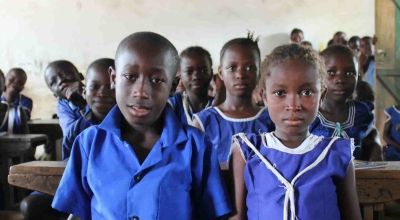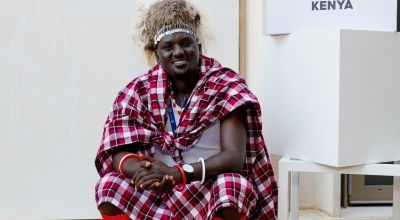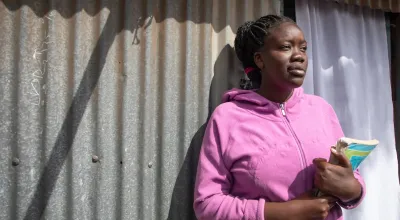
Read our 2023 annual report

Knowledge Hub
Access to science equipment has proven to be a formula for success for schools in Kenya, that have won awards, travelled to national exhibitions and seen an increase in students’ grades in STEM subjects under an innovative education programme.
Concern Worldwide, with funding from the Datatec Group, is supporting STEM education in the area and has delivered mobile laboratories and science kits to eight schools in Marsabit county over the past year.
Reaching new heights
Boru Ali, head teacher in Bubisa Primary School, said that he has already seen a surge in interest in STEM among students since they received the equipment.
Pupils from the school even managed to beat teams from ten other schools to win a coveted county Science Fair award last year.
Under the project – with collaboration from Kenya’s Ministry of Education, Young Scientist Kenya and STEM Impact Kenya - the winning students were then able to attend the 2023 Kenya Innovation Week, alongside other student exhibitors in Nairobi in November.
He said: “When Concern brought the science equipment, we were happy, the learners were excited, the teachers were happy. The students and the teachers really interacted with the equipment, and it really improved our performance, we had all the Grade 7 and the Class 8 classes doing practicals with the lab equipment.
“In 2022, we had a mean result of 54 for science, but after interacting and learning and using this equipment, the mean score improved from 54 to 67.
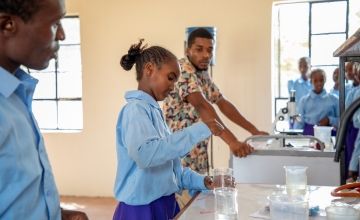
“We also had a science fair, and there we really performed, we were the best in our county. And through the same organisation, we were taken to Nairobi and our learners were exposed (to more experiences). They interacted with many new people and were motivated. In fact, when you look at the teachers and the learners, they feel like things have changed for them. They can now do more with this equipment and they can learn faster.
“What changed most is their attitude. Initially students, especially girls, were not encouraged to take science subjects. They always had low motivation towards mathematics and science, but when you look at them now, they are really motivated. In fact, their mean score in mathematics and science improved.”
The schools have also collaborated with the local authorities to improve access to STEM subjects, with Bubisa Junior Secondary School successfully advocating with the Ministry of Education for funding for two new science teachers.
Challenging gender norms
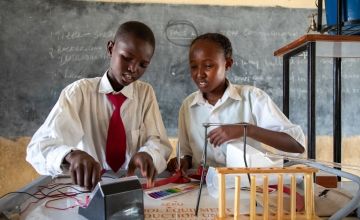
To date, the programme has reached 646 students - 375 girls and 271 boys. Mr Boru said that the programme has challenged some people’s beliefs that girls can excel in studying STEM subjects, and the results have spoken for themselves.
He explained: “When we got to this science kit and the mobile lab, we were really encouraged. You know normally when we do exams, we always call the parents and of course the students’ performance is on the agenda, and we have always discussed with them how their child has performed. Now the parents have seen how students can improve in science subjects and maths subjects, and this is not just the boys, there are girls who performed even better than boys in these STEM subjects.
“I am a happy teacher because the learners are so encouraged to keep learning, despite the challenges they face such as the recurring droughts, most of them come from vulnerable households, with low purchasing power. Their attitudes are hopeful and positive.
"We had no equipment before, and now we do. The students were especially happy because when the equipment was brought, they were told, this is for you. Their enthusiasm peaked and the lessons have been more meaningful and impactful.”
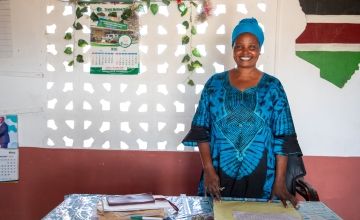
Janet Lokit is the head teacher at Kalacha Nomadic Junior Secondary School and also addressed how the STEM equipment is helping girls to reach their full potential.
She explained: “With this mobile lab, our children improved a lot in science. We are not alone in using the mobile lab, it benefits all the community: all the children in the schools around come and do their practical sessions here.
“Now, the attitude from the girls towards science is positive, because they like the manual, practical sessions. Before, the challenge was that we needed to obtain chemicals, or some instruments. Now, we have the full lab. We have the chemicals; we have the apparatus. We can do it.”
Nurturing talent
Brian Anungo is a science teacher at Kalacha Nomadic Junior Secondary School, his enthusiasm is infectious as he explains what a difference the science laboratory and equipment has made to his classes.
“I have just joined the system recently, I am doing my best to help these kids, nurturing their talents.
“The thing I enjoy most in teaching, particularly the science part, is the practical part. The practical part of the science. Because in the practical session, we do the real thing. We engage in the real thing, which are applied in real life scenarios. And then the lessons always seem interesting - our students participate actively, so there is no boring time in the lesson.
“Having the mobile lab in our school is an important thing because, number one, we do not have a laboratory. There is no availability of space in our school. So, there is that chance of creating space anywhere where we are comfortable, where we can carry out the practical sessions.
“By using the mobile lab, it is possible to move the apparatus wherever we feel we can, where it is safe and practical. For theory, the students tend to be very inactive. But when it comes to the practical sessions, they are active, active, active.”
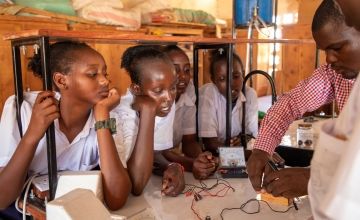
Marsabit County is a largely pastoralist community in Northern Kenya, which has been one of the areas worst affected by the droughts in recent years. Many have lost their livestock and in turn their entire livelihoods. a lifestyle which means that when drought strikes, they lose their livestock, decimating their entire livelihood.
Many of the parents whose children attend the school that received this equipment come from didn’t get to complete formal education and are keen that their sons and daughters can enjoy the benefits of school.
Mother-of-eight Kabale Wario explained: “I never got an education; I have always felt bad about that. I am proud of my children for going to school and doing so well. In fact, my first-born son, Abdirahman, who is currently studying at Umma University, got direct entry into higher learning.
“It is difficult to raise and educate eight children, the drought especially has been a hard blow."
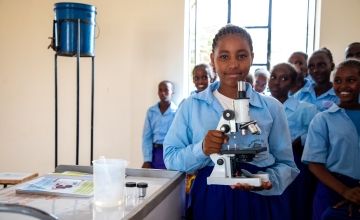
Back at Bubisa Primary School, Mr Ali said that the sky is the limit for the budding scientists and their ambitious school, as they look towards the future.
“The first thing we will be doing is interacting with the mobile lab and equipment even more. We will be doing more practicals and we are expecting even better results than even the ones from last year.
“The number of learners who are using the equipment will increase and they will be encouraged.
"We were happy after winning the county science fair, we were very happy and then the learners were really encouraged and then we were privileged to go to Nairobi. So, when we went there, learners participated and those who went there came back and we gave them time to tell us about everything they saw and did during a school assembly. Everybody was happy, some of the other students were saying next time it will be them going, so learners are really encouraged, and they are happy. In fact, if there is another science fair, we will always try our best to be there.
"Winning that trophy has made everyone - me, the teachers and the learners - feel encouraged and we are saying now that we can do more. We never thought that we could win a trophy because of science. But now that we have seen that we can, we will make sure that that this trophy will remain here, and we will go for more of these opportunities.”
Concern Worldwide, with additional funding from Datatec Group, will reach more schools in Marsabit country in the coming year. The second phase of the programme will also look to deepen engagement with the school’s board of governance, train teachers in the delivery of STEM and organise a Science Fair where students can demonstrate their innovative ideas.



